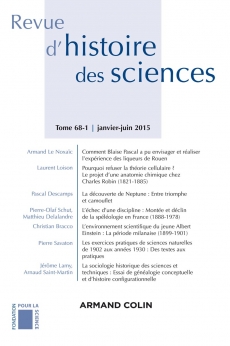
Revue d'histoire des sciences - Tome 68 (1/2015)
Pour acheter ce numéro, contactez-nous
Recevez les numéros de l'année en cours et accédez à l'intégralité des articles en ligne.
Charles Robin fut l’opposant principal à la théorie cellulaire en France au cours de la période 1850-1880. Il s’agira ici de comprendre cette opposition à l’aune du vaste système anatomophysiologique élaboré par Robin durant la seconde moitié des années 1840. Ce système était fondé sur une conception chimique et dynamique de la substance vivante, et ne laissait aucune place significative au niveau cellulaire. Nous montrons également que le schéma explicatif de Robin était lui-même solidaire d’une attitude philosophique marquée par le positivisme comtien. Comme Auguste Comte, Robin ne se départit jamais d’une certaine hostilité vis-à-vis de ce qui était perçu en France comme une actualisation directe des principes de la Naturphilosophie allemande. La dernière partie de cette étude expose la controverse qui opposa Robin à Rudolf Virchow entre 1866 et 1873. Cela nous permettra de relativiser l’héritage de Robin, et donc son influence réelle sur le cours de la biologie française.
Charles Robin was the main opponent of cell theory in France during the period 1850-1880. My aim here is to understand this opposition in the light of the vast anatomo-physiological system developed by Robin during the second half of the 1840s. This system was based on a chemical and dynamical conception of living matter, and left no significant place for the cellular level. I also show that Robin's explanatory principles were united themselves by a philosophic attitude marked by Comtian positivism. Like Auguste Comte, Robin never abandoned a certain hostility towards what was perceived in France as a direct updating of the principles of German Naturphilosophie. The last part of this study exposes the controversy which set Robin against Rudolf Virchow during the period 1866-1873. I will seize the occasion to put in perspective Robin's legacy, and thus its real influence on the course of French biology.